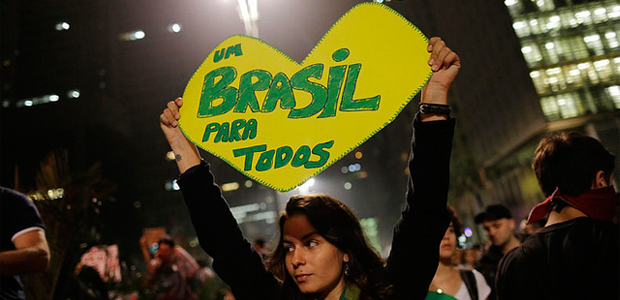The continuing protests in Brazil are a symptom of a lack of political accountability. Politicians may be beginning to hear what needs to be done but there’s a long way to go. Josmar Verillo, vice-president of Amarribo Brasil explains why.
Ribeirão Bonito, Brazil, 23 June 2013 – People power may be beginning to have results in Brazil. When President Dilma Rousseff first went on television to try to calm the millions of Brazilians who have been demonstrating by promising to tackle corruption few people believed she had a solution. The people are still protesting but there are some small signs of progress.
The most important sign is not the extra money promised by President Rousseff for infrastructure, education and health, or the referendum that will let people vote on key issues. It is the move in Congress last night to vote against amending the constitution to take powers away from District Attorneys. This was a proposal that had been put forward by a Congress unhappy and unnerved that so many high ranking politicians were being convicted in a corruption scandal.
The landmark case, known as the Mensalão, saw 25 people convicted last year including high profile politicians for orchestrating a network of political bribes. Congress reacted by trying to curb the power of District Attorneys to investigate them.
No wonder Brazilians do not trust their leaders. They see they are able to get away with wasting money – often because of corruption – at the same time as bus fares are raised, a move that clearly hurts the poor. Just cancelling the hike in bus fares, which was done, and promising a referendum will not be enough to appease the people and neither will President Rousseff’s commitment to zero-tolerance for corruption. Much more needs to be done, particularly on corruption.
There are studies that show corruption is increasing and is now costing upwards of $40 billion each year. Brazil ranks 69 out of 174 countries on the 2012 Transparency International Corruption Perceptions Index with a score that indicates significant problems with corruption.
But the people don’t need to look at the annual Index to see what’s wrong. Hardly a day goes by without some kind of scandal involving a politician or a public institution at both the national and regional level. But it is only after great public outcry – following stories in the press — that there is change.
This happened in 2011 in the southern state of Paraná. Investigative journalists trawled through hundreds of memos and thousands of budget lines of the state government and discovered that politicians had created a roster of “ghost employees”. Millions of dollars were being systematically rerouted from public funds to the bank accounts of the ‘ghosts’ which were in effect controlled by politicians.
The publication of the story resulted in those implicated losing their jobs. The journalists were awarded the Transparency International and the Instituto Prensa y Sociedad (Press and Society Institute) 2011 Latin American Investigative Journalism Award for their work.
Politicians have so far done little to win the trust of the people, which is why it is not surprising that Brazilians are worried about the huge expenditures on the World Cup. Initially the government tried to pass a law making the World Cup finances secret, which many suggested was a way to cover up bribe paying. But there was so much outrage that they had to revise that.
There is a civil society initiative to monitor both the World Cup and the 2016 Olympics. It is called Jogos Limpos (Clean Games) but so far it has not reached as many people as the demonstrations on the street. FIFA also has its own sustainability report but the reality on the ground is that the lack of trust in politicians has overshadowed the positives that FIFA is trying to promote.
President Rousseff stated clearly that she wanted to fight corruption during her time in office and she made a good start. She co-started the Open Government Partnership in 2011 with the United States, which aims to make more information about how government works available to the public. This is now endorsed by more than 42 countries.
She was also instrumental in getting the Ficha Limpa (Clean Record) law enacted. This was part of a citizen initiative that collected more than 1.6 million signatures in 2010. The law stops convicted citizens from participating in elections and being elected for public office. In the most recent local elections hundreds of candidates convicted for corruption were barred from participating.
Unfortunately, Congress is now trying to change the law to allow convicted criminals back into office. This coupled with pay raises for politicians and the fact that the governing coalition of parties is so large it required the creation of 40 ministers – with their special perks — has only contributed to the people’s mistrust and anger.
Today we live in a world of global images. Brazilians have seen the uprising in the Middle East and North Africa that brought regime change. They are watching as thousands of people take to the streets in Turkey, ostensibly to protect a small patch of green grass in the middle of Istanbul. They have learnt that if you get thousands to march, you attract the attention of the power elites.
In November 2012 Brazil hosted the 15th International Anti-Corruption Conference which was opened by President Rousseff. Its final declaration called “on leaders everywhere to embrace not only transparency in public life but a culture of transparency leading to a participatory society in which leaders are accountable.”
The action in the streets is acting as a wake-up call to government: you are accountable; listen to your people.
Carousel image: Creative Commons, Flickr/ Semilla Luz

















 Connect with us on Facebook
Connect with us on Facebook Follow us on Twitter
Follow us on Twitter